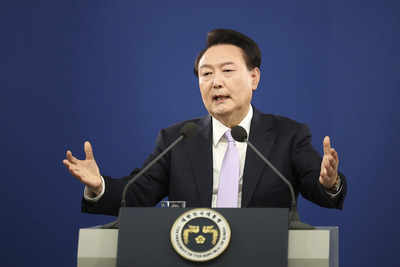[ad_1]

South Korean President Yoon Suk Yeol declared an “emergency martial law” on Tuesday, accusing the opposition of controlling parliament, sympathizing with North Korea, and engaging in activities that paralyze the government.
The move, announced during a televised briefing, marks a critical escalation in South Korea’s ongoing political crisis.
“To safeguard a liberal South Korea from the threats posed by North Korea’s communist forces and to eliminate anti-state elements… I hereby declare emergency martial law,” Yoon said in an address to the nation.
President Yoon, who has faced persistent challenges from the opposition-controlled National Assembly since taking office in May 2022, described the step as essential for defending the country’s constitutional order. However, the immediate implications for governance and democracy remain unclear.
Opposition allegations spark controversy
The announcement comes a month after the liberal opposition, led by the Democratic Party of Korea, accused Yoon of plotting to impose martial law to sidestep impeachment over alleged abuse of power. Opposition leader Lee Jae-myung warned that martial law could lead to “a perfect dictatorship,” pointing to historical precedents of its misuse.
In response, Yoon’s office had dismissed these allegations as “fabricated propaganda” and had accused the opposition of spreading falsehoods to manipulate public opinion. Prime Minister Han Duck-soo had also refuted the claims, emphasizing that South Koreans would not accept such a move.
Heightened tensions
The strained relationship between Yoon and the opposition reached a breaking point earlier when Yoon became the first president since 1987 to skip the opening ceremony of a new parliamentary term. His office cited ongoing parliamentary probes and impeachment threats as the reason for his absence.
Opposition lawmakers claim that Yoon had undermined democratic processes by using his veto power against parliamentary bills and appointing loyalists to key military positions, fueling speculation about his intentions.
Political polarization
The martial law declaration has further polarized South Korea’s political landscape. Experts warn that the deepening divide could erode public trust in democratic institutions.
“This confrontation has turned into a political war,” said Choi Jin, head of the Institute for Presidential Leadership. “It’s an all-or-nothing battle that benefits no one.”
Jhee Byong-kuen, a political science professor at Chosun University, criticized Yoon’s uncompromising leadership style, saying it exacerbates polarization and public disillusionment.
[ad_2]
Source link


